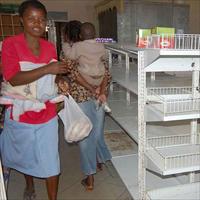Top ten most underreported humanitarian stories of 2007 - Political and economic turmoil sparks health-care crisis in Zimbabwe

Rampant unemployment, skyrocketing inflation, food shortages, and political instability continued to wrack Zimbabwe in 2007. Up to 3 million people are believed to have fled to neighboring countries in recent years among a population of 12 million.
The national health-care system, once viewed as one of the strongest in southern Africa, now threatens to collapse under the weight of this political and economic turmoil with the most acute consequences potentially for the estimated 1.8 million Zimbabweans living with HIV/AIDS. Currently, less than one-fourth of the people in urgent need of life-extending antiretroviral (ARV) treatment receive it. This translates into an average of 3,000 deaths every week.
And the prospects for a further scale up of the national AIDS program are dim. Trained medical professionals are leaving the country, the government program for HIV/AIDS treatment is oversubscribed, and the lack of ARV supplies has stifled further expansion. Patients often face obstacles to reach hospitals or clinics because of high fuel and transport prices.
Through programs in Bulawayo, Tshlotsho, Gweru, Epworth, and various locations in Manicaland province, MSF provides free medical care to 33,000 people living with HIV/AIDS, 12,000 of whom are receiving ARV treatment — nearly one tenth of all people on treatment. However, MSF's ability to care for more people in need is hindered by the lack of trained health workers, restrictions on which staff can prescribe ARV drugs, and stricter administrative requirements for international staff to work in the country. At the same time, Zimbabweans are feeling the health impact of degraded or nonexistent water-and-sanitation systems.
During the year, outbreaks of diarrhea affected people living in the capital, Harare, and Bulawayo, the second largest city. Fleeing the country is also a dangerous enterprise as evidenced by the reports of refugees being beaten and raped along the South African border, and those who do make it across may be destined to live in the shadows with little or no access to health care.
 Back and Next - Back and Next
Back and Next - Back and Next See Also - See Also
See Also - See Also